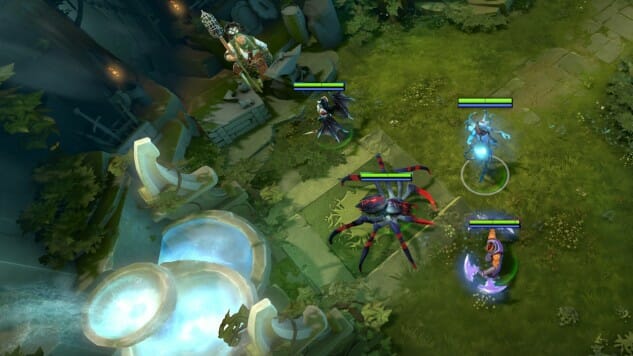Spending 3000 Hours on a Single Game: Life with Dota 2

My Steam client says I’ve played Dota 2 for 2,933 hours. Before Dota 2 came along, I never imagined myself as someone who would ever spend that much time with a single videogame. The longest I’d spent with a multiplayer game beforehand was about four months, when I played Call of Duty 4: Modern Warfare every day after school. But running around Middle Eastern rat mazes looking for kills got boring, so I moved on. The idea of spending that much time with a single game felt foreign to me. What would a game have to be to someone for them to play it for so long?
On September 19th, 2012, the day I played my first match, it was a challenge college wasn’t giving me. After my first semester I switched majors from Creative Writing to English and the classes became much easier. I had to read a lot of books, but I didn’t have to study much to keep up. I could knock out midterm papers in a day. So I learned the underlying framework of Dota 2 and how it worked by looking at my phone when a class got boring. I looked up character guides, item builds, and watched tutorials on what you should do at any given time during a match.
The following year, when I got my brother and couple of friends into it, Dota 2 was an interest to share, something to talk about in lulls of conversation. I remember the first time a few of my friends came over to my house while I watched a professional match between teams iG and DK. We were about forty minutes into the match and decided we’d go out and get food after it was over, since most matches didn’t take longer than fifty minutes. The game ended up lasting another hour. I was riveted to the tension of watching two teams not really know how to finish a match and waiting for the axe to fall, but I was terrified that I was boring my friends out of their minds.
As it turns out, a few of them ended up curious about the game, so we got some computers together and had an honest-to-goodness college LAN party in late 2013. For a long time after, we’d use it to fill conversations. If the person in our group who didn’t know anything about Dota hadn’t met us for dinner yet, we’d talk about highlights from the last tournament, or swap stories about exciting or frustrating moments of our own. We’d waste nights parked outside a restaurant, talking about how a random teammate was altogether too stupid to have bought maelstrom as Timbersaw. We vented and confided in each other about a videogame, which was a strange kind of practice for being empathetic.
At a time when I didn’t know what I was going to do with myself, Dota 2 was an anchor. The first outlet I’d ever reviewed games professionally for, GamePro, closed in late 2011. All the articles I’d written until that point were gone (except for a list article with a misleading title), and I dreaded the thought of having to rebuild my portfolio. So, a handful of freelance articles notwithstanding, I dove into Dota 2 (and college) headfirst. It was around this time (mid-2013) that I started joining extended Dota 2 communities on websites like Giant Bomb, Reddit, Gamers With Jobs, and Neogaf. The game client even had built-in chat channels, so I simply had to sign myself up and ask people to group up with me for a match.
-

-

-

-

-

-

-

-

-

-

-

-

-

-

-

-

-

-

-

-

-

-

-

-

-

-

-

-

-

-

-

-

-

-

-

-

-

-

-

-








































